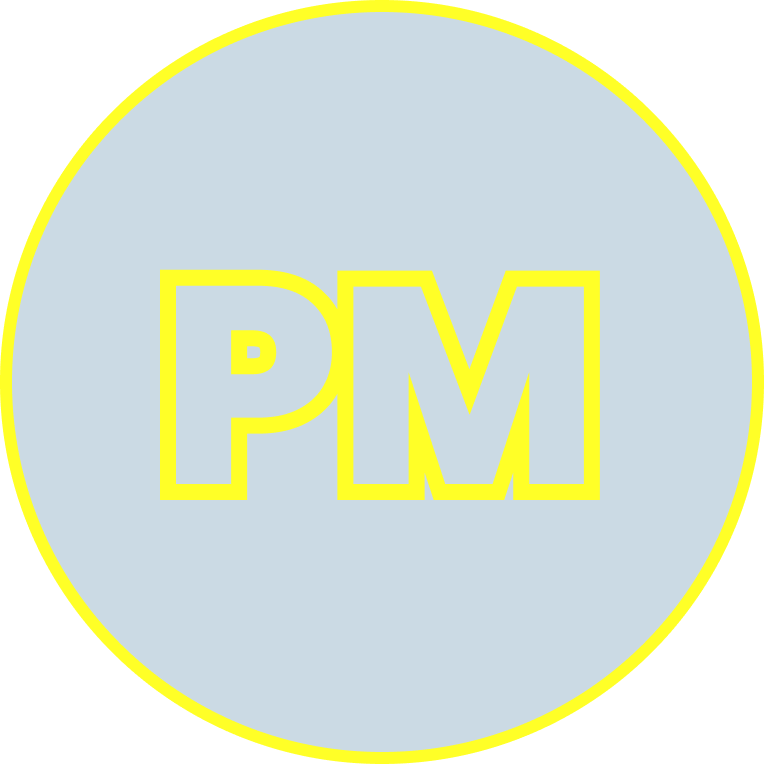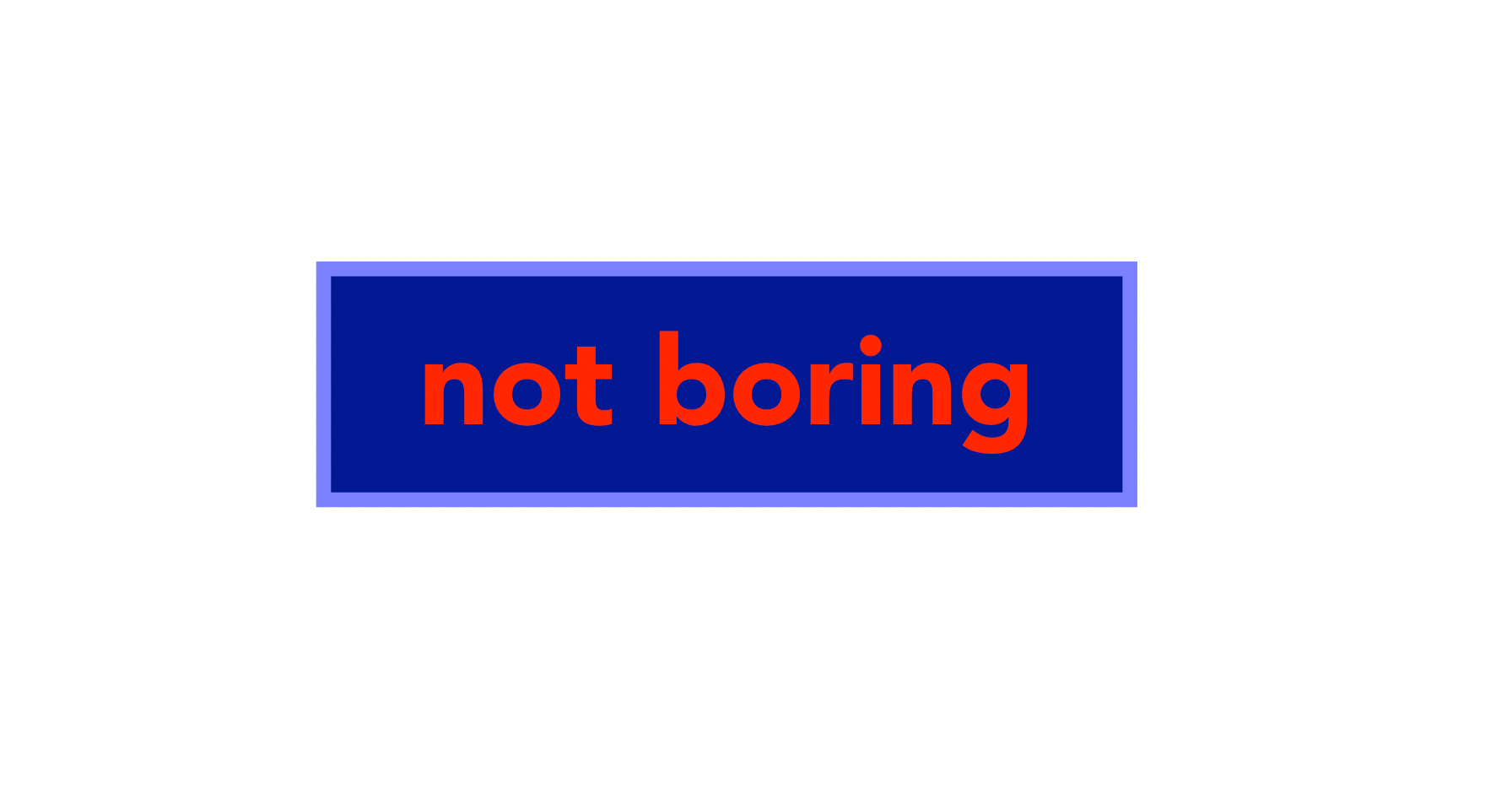not boring
The What
We are launching an online club for Not Boring people who want to try new and exciting things together IRL, starting in New York City. Not Boring is a diverse community of people who are the best at what they do from 9-5, and want to develop the rest of their life beyond the office and build a more varied network.
Not Boring will start simple with a chat group where members can:
Get exclusive access to Not Boring events
Start a club around a passion or something you've been wanting to get into
Rally a group to go to an art opening, lecture, or meetup
Find people to take classes, write, record podcasts, and create with
Organize dinners to meet new people over good food and conversation
Join an online-offline book club (hopefully more successful than Slack Book Club)
We'll help eliminate two of the biggest impediments people have to being not boring:
Discovery: Each week, we'll surface relevant, high-quality events.
Logistics: In addition to hosting and coordinating Not Boring events, we'll help plan and organize the events, clubs, and dinners that members want to host so that logistics aren't a limiting factor to growth.
Not Boring will grow over time based on the interests of the members. We expect that members will start interest-based clubs, support circles, workout groups, and travel together, but that's probably just scratching the surface. Not Boring will show up in force for each other, time and again.
I'm launching Not Boring with Sam Liebskind. Sam works for a startup called Geneva, which is launching the beta of its group messaging app built for communities today. Geneva is rolling out some exciting functionality with communities like this one in mind, so we opted to plant one of the first of what will be thousands of flags there instead of going with a Slack group.
The Why
Last year, when I was reviewing 2018 and planning 2019, I realized that I was boring and one-dimensional. I spent most of my time working, and when I wasn't working, I was thinking about work. So I made it a goal to become not boring in 2019. I took a writing class, started writing this newsletter, launched Debate Club, joined the OnDeck Fellowship, joined a book club, traveled more often, and generally started saying "yes" more often.
It took a lot of effort, but trying new things with new people made 2019 one of the best years of my life. I've made genuine friendships, learned valuable skills, and had novel experiences. Paradoxically, focusing less on work has opened up more exciting work opportunities, and organically building a diverse network of great people from a variety of industries has been priceless as I've turned my attention to starting a company. Overall, I'm less boring.
So over the past few months, I've talked to hundreds of people about how they learn, build relationships, and explore and maintain hobbies. I've had countless coffees, sent surveys, and held focus groups. I've had as much fun over the past three months as I've ever had because I've been learning by meeting curious, interesting, and generous people and saying yes to new experiences. Specifically, I've learned that:
Adult life doesn't have a good answer for college extra-curriculars.
The real world is more like college than we think. Classes are like jobs, sports are like rec leagues, dorms are like apartment buildings or co-living, social clubs are like fraternities and sororities, bars are like... bars. But extra-curriculars and clubs, which many people cite as their favorite part of the college experience, don't have a real-world equivalent. Our options today are often single-player (reading, writing), one-off (Meetups, trip to the art museum), or those hobbies that everyone has and is embarrassed to give as their answer (travel, hanging out with friends).
Extra-curriculars allow for a structured, yet low-pressure pursuit of hobbies and interest, with a committed group of people. The skills I learned and friends I made in extra-curriculars have stuck with me more than anything I learned in class. The real world needs something that makes it just as seamless to pursue hobbies and interests.
Making connections is easy, building relationships is hard.
Almost anyone in the world is reachable by e-mail, DM, networking event, or warm intro, and people are surprisingly willing to chat if you have a compelling reason.
But I've heard over and over again that taking the next step - having that second coffee, keeping the conversation going - is really hard and awkward. The spark almost never strikes in that first conversation; it's cultivated over time as trust builds.
The most curious people want to build networks outside of their day job field.
So many communities that exist today are built around a shared professional or demographic identity. There are Slack groups for DTC people, idea dinners for hedge fund managers, Signal chats for fintech entrepreneurs, and a whole host of even more narrowly defined groups. Those communities are valuable for growth because they create safe spaces with a shared language, and enable growth and opportunities within a specific field.
But the most curious people I've spoken to value the intersections. They realize that the most interesting new opportunities and ideas are mashups of the best ideas from multiple disciplines. And they want an easier way to generate the serendipity that generates those mashups. They want similarity in intellect, passion, and curiosity, and diversity in everything else.
Repeated interaction around growth experiences builds relationships.
Over and over again, people cited classes and other small group learning activities as the best way they’ve found to build relationships. Genuine relationships are built when you go through a challenge with someone, day after day or week after week, and come out better on the other side.
The question, "What do you do outside of work?"makes people cringe.
I remember sitting in the lobby of Hotel Giraffe three years ago with my mom and her business partner, Liz, when Liz asked, "So, what do you like to do outside of work?" I was knee-deep in growing a startup, and I didn't have an answer. I liked... working.
As I've talked to people and asked them that same question, the reaction is a visceral embarrassment. "What do you do outside of work?" is a referendum on what we've demonstrated we care about, and most people aren't happy with the answer. It's not surprising. We work so hard on one particular thing that we fail to develop the skills, passions, and interests that open up the universe of potentially much more interesting things.
We're creating Not Boring to make it seamless, fun, and rewarding to explore interests and hobbies outside of work with a curious, adventurous, passionate group of people. We want to build a community that supports each other, makes each other better, and provides each other with opportunities that we couldn't have accessed before. We want the answer to the question, "What do you do outside of work?" to be a point of pride and an important part of our identity.
The How
Finding that magical mix of people is a tiny bit of science and a lot of art. We're going to keep the community small and well-curated to start, and grow as we learn what works.
We are forming a diverse group of people who share some important characteristics: intellectually curious, adventurous, growth-minded, open to experience, generous, and multifaceted. Whether you want to throw events or attend with enthusiasm, contribute your creativity or provide feedback and amplification to others, a strong community needs all types. Other than assholes. Even the smartest, most curious asshole can't join our club.
Not Boring is free to join for now, and if we do start charging a membership fee, people who join before we do will be grandfathered in to free lifetime digital access. For us, this is about learning, meeting great people, and trying new things.
Why join?
Perks
Access to a digital community of likeminded not boring people
Curated and coordinated events and activities
Discounted access to events, classes, and experiences
Benefits
Learn and grow through hobbies, interests, and experiences
Build a diverse, talented, and interesting network
A great answer to "What do you do outside of work?"
If you fit the description, we want you to join, and we want you to bring in your friends who do too. Apply below; admissions will be rolling, and we'll start welcoming people into the club in two weeks. Join us!




